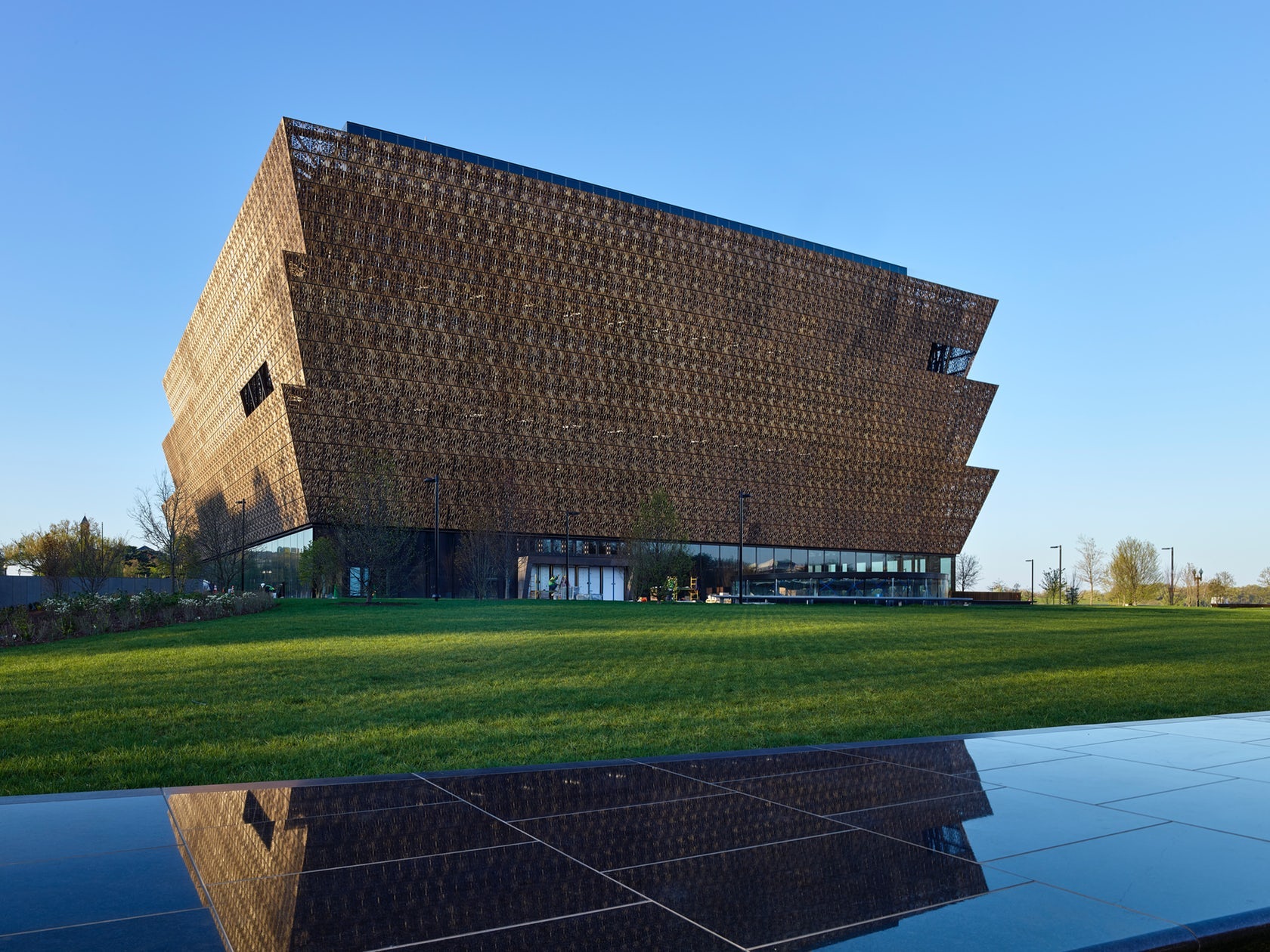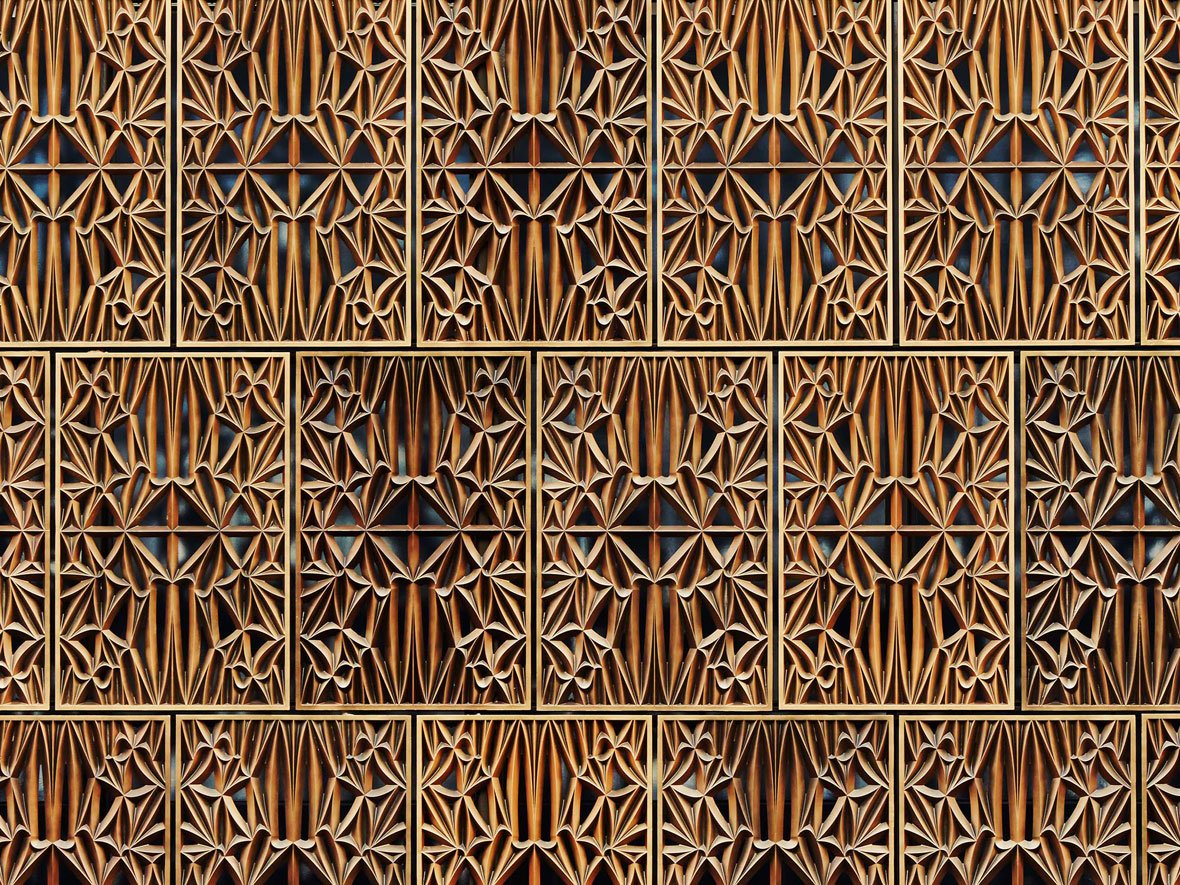No matter which side of the partisan divide you stand on, it’s fair to say that Washington has been swept up in some serious political turbulence over the past year. However, one new arrival in that city has risen above the furor and reminded us all that great architecture can bring people together to look to the future with hope.
When Sir David Adjaye and his team saw their design for the National Museum of African American History and Culture completed on the Mall last year, it marked a seminal moment for a firm that has experienced a meteoric rise over the past decade. National monuments, housing, retail, master planning, collaborations with artists, libraries, schools, art museums — you name it, there is not a building type that Adjaye Associates has not touched and redefined in the process.
Today, Adjaye Associates will be recognized for its innovative work across four continents, receiving Architizer’s coveted Firm of the Year Award at tonight’s A+Awards gala.

Sir David Adjaye; via MIT © Ed Reeve
Adjaye was born in Tanzania and lived in Egypt, Yemen and Lebanon before moving to the U.K. at the age of nine. His experience living and working within dramatically varied contexts has fostered an architectural language that possesses an incredible sense of cultural awareness, not to mention an ability to adapt to the needs of each unique project. It is telling that no two Adjaye projects are alike: Each responds to the conditions of its site with a combination of vernacular sensibility and contemporary flair.
Blending an astute understanding of the past with modern construction systems, Adjaye Associates personifies all that makes architecture firms an essential asset to the built environment today. Architizer sat down with Adjaye to reflect on his firm’s achievements to date, as well as its exciting plans for the future — and hear his indispensable advice for the young architects following in his footsteps.
Paul Keskeys: Congratulations on winning Architizer’s Firm of the Year Award! What does it mean to you personally for your firm to be recognized in this way?
David Adjaye: It’s an incredible honor and, of course, very humbling. Every project we undertake excites us, either because it allows us to rethink standard typologies or because it offers new modes of engagement with communities. To be recognized for work that you deeply believe in is incredibly rewarding.
In what ways do you think online, free-to-vote awards programs like the A+Awards help to raise awareness of great architecture with the broader public?
Architecture for me is about engagement. People are constantly affected by, responding to and reshaping their built environment. The more sophisticated and nuanced we can make the dialogue between users and design, the better off the profession will be. Programs like the A+Awards provide increased opportunity for the public to join the conversation about the ways architecture shapes and reshapes our world, and hopefully democratizes access to that dialogue.

The Smithsonian National Museum of African American History and Culture, Washington; photo by Alan Karchmer, via Newsdesk
One of your most significant buildings to date, the National Museum of African American History and Culture, was recently completed in Washington, D.C. What did you learn from undertaking this iconic project that you will take forward into future commissions?
The NMAAHC was a dream commission, and taught the firm a series of essential lessons, from how to work on complex sites with diverse stakeholders, to continuing to refine our research process, to really growing into the sense of responsibility to communities that comes with building. It really is an immense privilege and an immense power to shape the contexts where we live, and this cannot be regarded flippantly or lightly.
I think this project became the culmination of 15 years of the firm’s thinking and testing, and has ultimately become the moment in which our firm matured and entered a new chapter.
Projects like the NMAAHC and — in a very different sector — the Sugar Hill Housing scheme in New York have cemented your firm’s reputation as a growing influence in America. What are the challenges you have faced as an increasingly global practice, and what are the opportunities? Which American city would you like to design in next?
I am genuinely open to working anywhere for the right project. I very much see architecture as a narrative tool; it is a way to emerge and continue stories about place. And what is most interesting to me is to contribute in ways that make visible those soft nuances or nearly forgotten remnants of place that are often overlooked. So, to me, the challenge of a global practice is the opportunity, which is to create designs that understand and resonate with their context in a deeply meaningful and sophisticated way. This is a tall order when working in places that are unfamiliar, because the task is not to otherize or exoticize, but to find a real empathy.

Rendering of the Latvian Museum of Contemporary Art by Adjaye Associates and AB3D; image © Malcolm Reading Consultants
Back in the studio, which three projects on your drawing board are you most excited about and why?
I am very lucky to be in position to only pursue projects that excite me, so I am passionate about all the projects in our portfolio. Some notable upcoming projects include the first national Museum of Contemporary Art in Latvia, a pair of mixed-use residential projects in London, a new gallery for the Linda Pace Foundation in Texas and my first residential tower in Manhattan.
What three top pieces of advice do you have for young architects who are just entering the profession?
My advice to young architects is to get out there and engage. You cannot look at it as simply a profession. It’s kind of like a vocation; it’s a belief. You must be committed to changing or adding or being part of the discussion on the world’s environment. I think that searching for that passion is really what’s going to make the difference.
My other piece of advice is never take on a project that doesn’t excite you or have meaning. Particularly early in your career, those first steps you make will come to define you. So be patient and seek out projects, regardless of scale, that speak to your passion.
Sir David Adjaye OBE was born in Dar es Salaam, Tanzania, in 1966 to Ghanian parents and is currently based in London. He was raised across Africa, the Middle East and the United Kingdom. Having graduated from the Royal College of Art with a master’s degree in Architecture in 1993, he went on to establish his own studio, Adjaye Associates, in 2000, which now has offices in London, New York and Accra. Adjaye was knighted in 2016.
Adjaye Associates has completed over 50 projects across Europe, the United States, Africa, Asia and the Middle East. Two of his largest commissions to date are the design of the Smithsonian Institution’s National Museum of African American History and Culture on the National Mall in Washington (2016) and the Moscow School of Management (SKOLKOVO) (2010). He is currently working on the expansion of the new Studio Museum in Harlem (ongoing) and the design for the Latvian Museum of Contemporary Art (ongoing).



